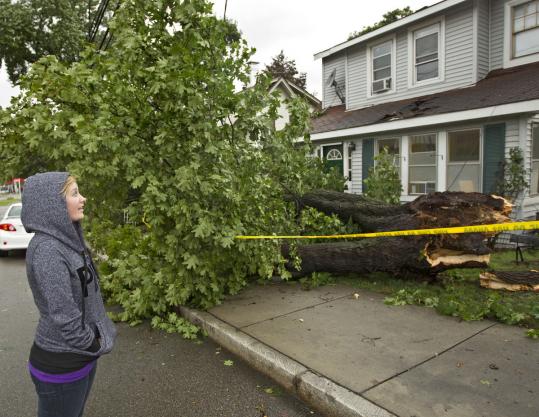HOME / NEWS / LOCAL / MASS.
Utilities blamed in Irene’s wake

Leigh Lally, 24, was home when a tree felled by Tropical Storm Irene on Aug. 28 hit her family’s Quincy house. (Matthew J. Lee/Globe Staff)
By Michele Morgan Bolton
Globe Correspondent / October 6, 2011
Officials in four communities south of Boston have filed complaints with the state Department of Public Utilities seeking an investigation into what some say was delayed response by National Grid and NStar to the power outages caused by Tropical Storm Irene.
The August storm that wreaked havoc along the East Coast cast thousands of Massachusetts residents into darkness while local authorities racked up overtime costs to respond to emergencies, clear downed trees and other damage, and haul off tons of spoiled food.
As of Monday, Duxbury, Hanover, Marshfield, and Quincy have filed official complaints with the state agency. Others, including Norwell and Foxborough, are in the process of filing similar complaints, while Scituate officials say they will not file an official complaint but will instead offer testimony at a series of adjudicatory hearings the state oversight department plans to hold, to hear from a number of communities on the response.
Times and locations of the hearings will be announced next week, said department chairwoman Ann Berwick. The utility companies must also file a “post-mortem’’ report within 30 days of a storm like Irene, which becomes part of any investigation, she said.
“We will look carefully at the companies’ performance during and after the storm,’’ Berwick said. “And we will have hearings in eight communities where members of the public and officials will be invited to testify.’’
The meetings will be assigned geographically based on the most serious complaints, Berwick said. Results of the investigation can range from no findings of fault by the utility companies to suggestions for fixing problems, or fines. “We have very high expectations which we communicate continuously. They certainly understand the importance of reliable service,’’ she said.
NStar spokesman Michael Durand said his company worked hard to get power restored after the Aug. 28 storm. More than a quarter of a million customers were without service the day after Irene hit that weekend, he said: “And by Wednesday we had that number down to just over 50,000.’’
NStar prioritized repairs to serve the largest number of customers, he said; at the same time the company declared a “Level 5’’ emergency response for the first time, anticipating significance damage and a multiday response.
Durand, as well as National Grid officials, said work crews that would normally help in the Bay State were struggling to assist regions along the entire East Coast. Local private contractors were in intense demand and competition was fierce to hire them, Durand said.
At the height of the storm, National Grid had nearly 500,000 customers without power in Massachusetts, said spokeswoman Deborah Drew. Within 48 hours, power was restored to two-thirds of those customers, 90 percent had power by that Thursday, and on Saturday, a week after the storm, all customers had power thanks to crews from Texas, Colorado, and Canada.
Drew called it “the largest single restoration effort in almost half a century.’’
Still, officials in Foxborough say National Grid not only lacked communication and responsiveness but had insufficient tree maintenance, and a general lack of preparedness. In a report, Town Manager Kevin Paicos said National Grid must improve its tree trimming and cutting program and, if it refuses, he would ask Attorney General Martha Coakley to assess fines and payments to support such a program under town control, using town-procured contractors.
Last week, National Grid’s Massachusetts president, Marcy Reed, apologized in person to the town for the post-storm fiasco.
In Quincy, city councilors have asked the state to investigate National Grid’s response to Irene to see whether it violated standards for response and preparedness. At one point, more than 8,000 city residents had no power and more than 50 trees were down, officials said.
Marshfield was quick to assess how NStar could guarantee a faster and more visible response to future storms, calling in a Sept. 8 letter the company’s response completely inadequate and, as in neighboring Duxbury, noting that there appeared to be no response for nearly the entire first day of the storm.
Durand countered that the company responded to 2,800 tree-related repairs both during and after the storm around the state, of which 1,400 had been termed emergencies.
In Norwell, town officials said National Grid ignored the town’s longstanding priority list to get power first to its water treatment plant, some nursing homes, and the South Shore Medical Center. Officials and residents were inflamed when they received calls to check the company’s website for information on restoration when none of them had power for the Internet.
“Norwell will be filing a complaint,’’ said Town Manager James Boudreau.
Scituate, on the other hand, has opted not to file a complaint and will instead attend one of the state agency’s sessions to share information, Town Administrator Patricia Vinchesi said. The town acted similarly after the December blizzard.
“We will follow that same course,’’ she said.
Dedham officials had harsh words for NStar following Irene when 20 percent of the town’s 24,700 residents were without power.
Selectmen recently met with the company to discuss mutual ways to improve response. The town can increase staffing at the emergency operations center, and direct non-emergency calls away from central dispatch, officials said. NStar can offer better two-way communication and add more staff to assist the town when needed, town officials said.
Subsequently, Dedham will not file a complaint, Town Administrator William Keegan said.
“I do think that we had a productive discussion and that if we are able to implement some changes in our operations on both sides, that the response will be improved during the next event,’’ he said.
Michele Morgan Bolton can be reached at michelebolton@live.com.
